
I am to show that the dictum of Dr. Ellis, that English as it is written is a dialect distinct from English as it is spoken, is true. It is not to be denied
| Spanish translation and annotations |

|
I am to show that the dictum of Dr. Ellis, that English as it is written is a dialect distinct from English as it is spoken, is true. It is not to be denied |
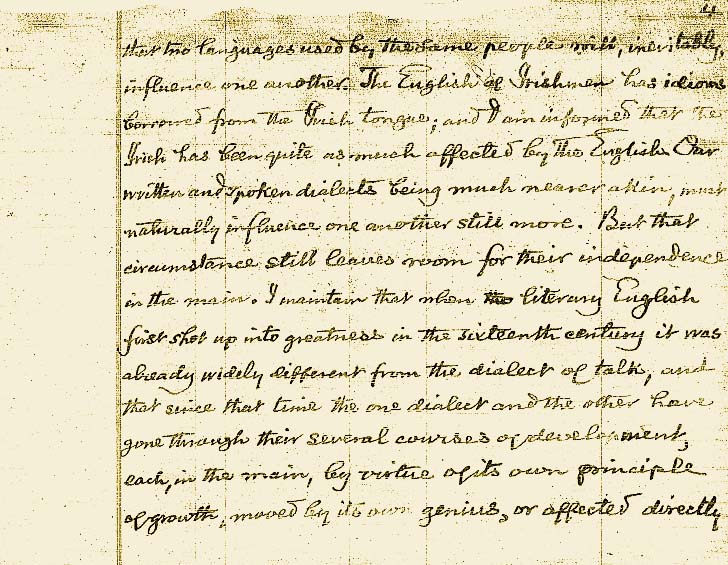
|
that two languages used by the same people will inevitably influence one another. The English of Irishmen has idioms borrowed from the Irish tongue; and I am informed that the Irish has been quite as much affected by the English. Our written and spoken dialects being much nearer akin must naturally influence one another still more. But that circumstance still leaves room for their independence in the main. I maintain that when literally English first shot up into greatness in the sixteenth century it was already widely different from the dialect of talks, and that since that time the one dialect and the other have gone through their several courses of development, each, in the main, by virtue of its own principle of growth, moved by its own genius, or affected directly
|
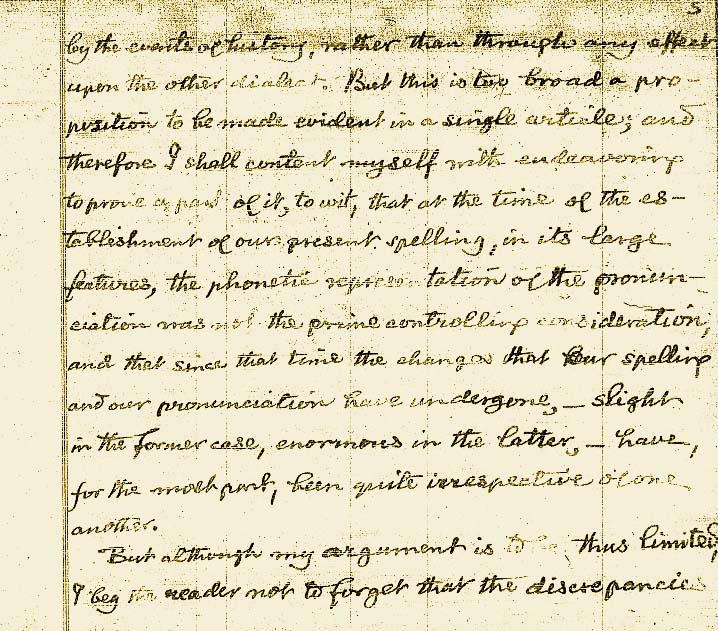
|
by the events of history, rather than through any effect upon the other dialect. But this is two broad proposition to be made evident in a single article; and therefore I shall content myself with endeavoring to prove a part of it, to wit, that as the time of the establishment for our present spelling, in its large features, the phonetic representation of the pronunciation was not the prime controlling consideration, and that since that time the changes that our spelling and our pronunciation have undergone, -slight in the former case, enormous in the latter, -have, for the most part, been quite irrespective for one another.
But although my argument is to be, thus limited, I beg the reader not to forget that the discrepancies |
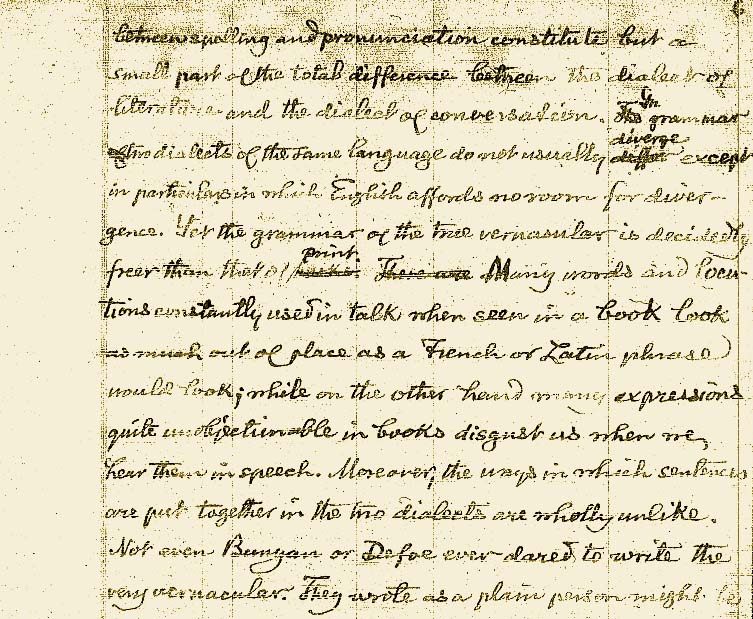
|
between spelling and pronunciation constitute but a small part of the total difference between the dialect of literature and the dialect of conversation. In grammar two dialects of the same language do not usually diverge except in particulars in which English affords no room for divergence. Yet the grammar of the true vernacular is decidedly freer than that of point. Many words and locutions constantly used in talk when seen in a book look as much out of place as a French or Latin phrase would look; while on the other hand many expressions quite unobjectionable in books disgust us when we hear them in speech. Moreover, the ways in which sentences are put together in the two dialects are wholly unlike. Not even Bunyan or Defoe even dared to write the very vernacular they wrote as a plain person might be |
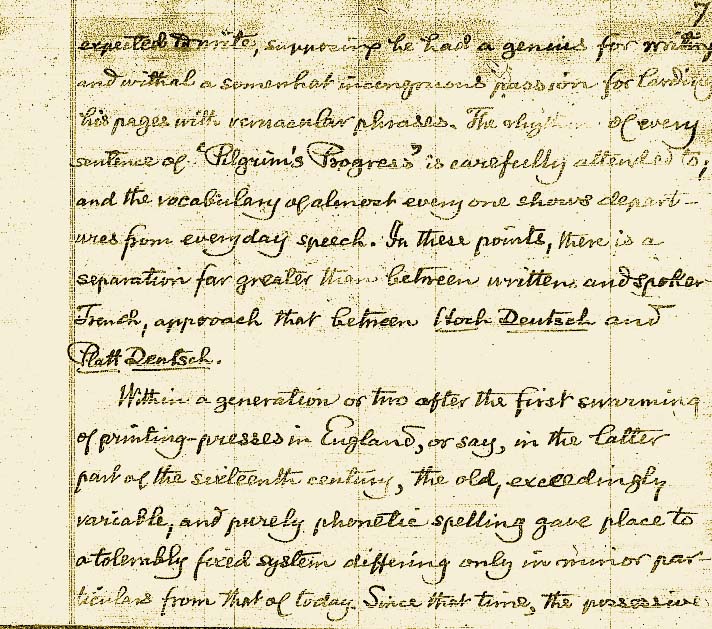
|
expected to write, supposing he had a genius for writing and withal a somewhat incongruous passion for loading his pages with vernacular phrases. The rhythm of every sentence of "Pilgrim's Progress" is carefully attended to; and the vocabulary of almost every one shows departures for everyday speech. In these points there is a separation far greater than between written and spoken French, approach that between Hoch Deutsch and Platt Deutsch.
Within a generation or two after the first swarming of printing-presses in England, or say, in the latter part of the sixteenth century, the old, exceedingly variable, and purely phonetic spelling gave place to a tolerably fixed system differing only in minor particulars from that of today. Since that time, the possessive case |
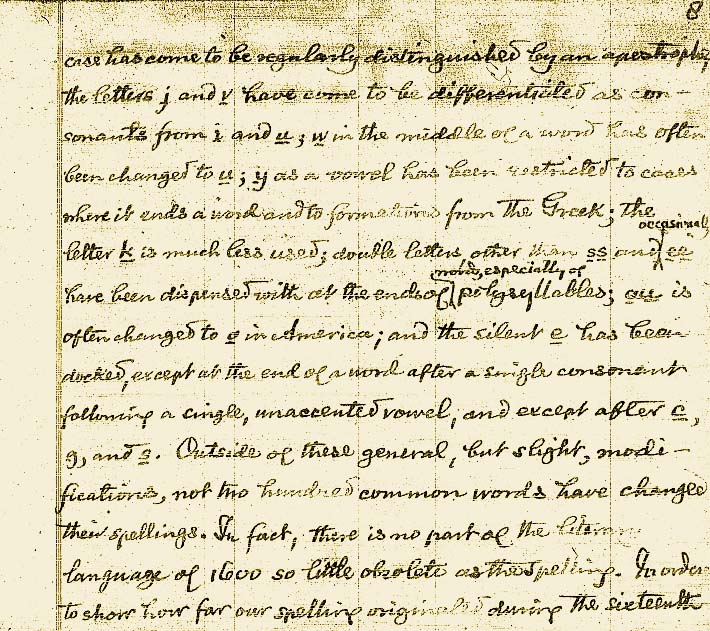
|
has come to be regularly distinguished by an apostrophe, the letters j and v have come to be differentiated as consonants from i and u; w in the middle of a word has often been changed to u; y as a vowel has been restricted to cases where it ends a word and to formations from the Greek; the letter k is much less used; double letters, other than ss and occasionally ee have been dispensed with at the ends of words, especially of polysyllables; ou is often changed to o in America; and the silent e has been docked, except at the end of a word after single consonant following a single, unaccented vowel, and except after c, and s. Outside of these general, but slight, modifications, not two hundred common words have changed their spellings. In fact, there is no part of the literary language of 1600 so little obsolete as the spelling. In order to show how far our spelling originated during the sixteenth
|
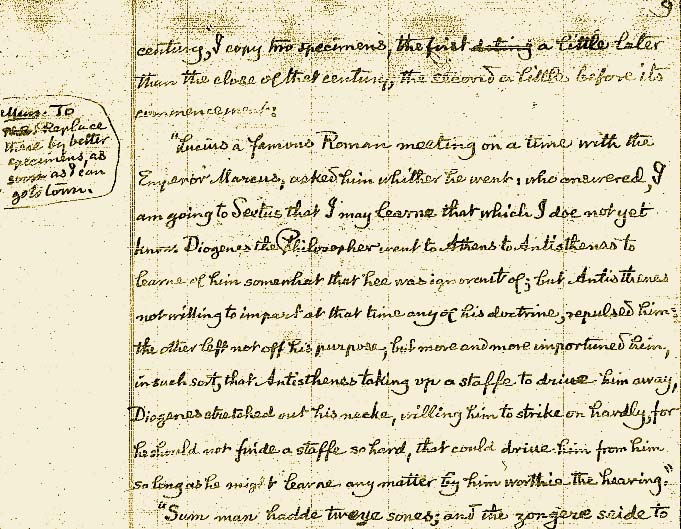
|
century, I copy two specimens, the first dating a little later than the close of that century, the second a little before its commencement:
[Note. To replace these by better specimens as soon as I can go to town.] "Lucius a famous Roman meeting on a time with the Emperor Marcus, asked him whether he went; who answered, I am going to Sextus that I may learne that which I doe not yet know. Diogenes the Philosopher went to Athens to Antisthenes to learne of him somewhat that hee was ignorant of; but Antisthenes not willing to impart at that time any of his doctrine, repulsed him: the other left not off his purpose, but more and more importuned him, in such sort, that Antisthenes taking up a staffe to drive him away, Diogenes stretched out his necke, willing him to strike on hardly, for he should not finde a staffe so hard, that could drive him from him so long as he might learne any matter by him worthie the hearing." "Sum man hadde tweye sones; and the zongere seide to |
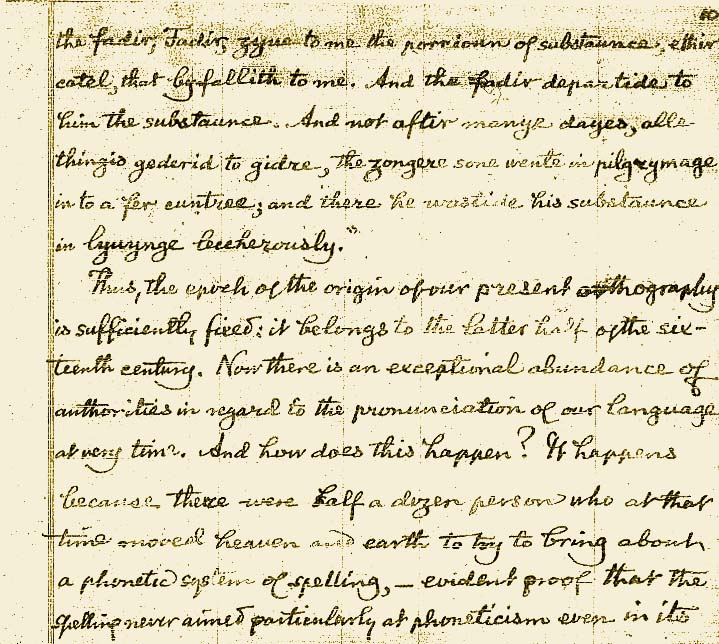
|
the fadir, Fadir, zyve to me the porcioun of substaunce, ethir catel, that by fallith to me. And the fadir departide to him the substaunce. And not after manye dayes, alle thingis gederid to gidre, the zongere sone wente in pilgrymage in to a fer cuntree; and there he wastide his substaunce in lyvynge leccherously."
Thus, the epoch of the origin of our present orthography is sufficiently fixed: it belongs to the latter half of the sixteenth century. Now there is an exceptional abundance of authorities in regard to the pronunciation of our language at very time. And how does this happen? It happens because there were half a dozen person who at that time moved heaven and earth to try to bring about a phonetic system of spelling, -evident proof that the spelling never aimed particularly at phoneticism even |
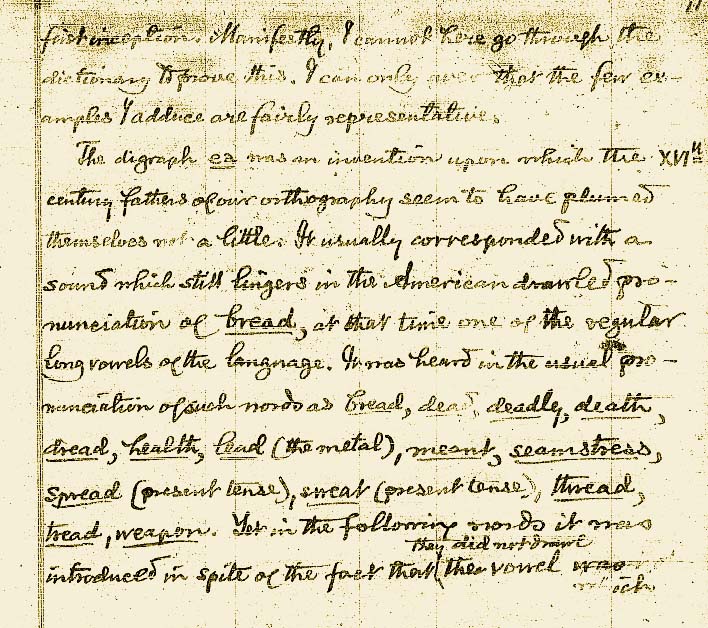
|
in its first inception. Manifestly, I cannot here go through the dictionary to prove this. I can only aver that the few examples I adduce are fairly representatives.
The digraph ea was an invention upon which the XVIth century fathers of our orthography seem to have plumed themselves not a little. It usually corresponded with a sound which still lingers in the American drawled pronunciation of bread, or that time one of the regular long vowels of the language. It was heard in the usual pronunciation of such words as bread, dead, deadly, death, dread, health, lead (the metal), meant, seamstress, spread (present tense), sweat (present tense), thread, tread, weapon. Yet in the following words it was introduced in spite of the fact that they did not drawl the vowel |
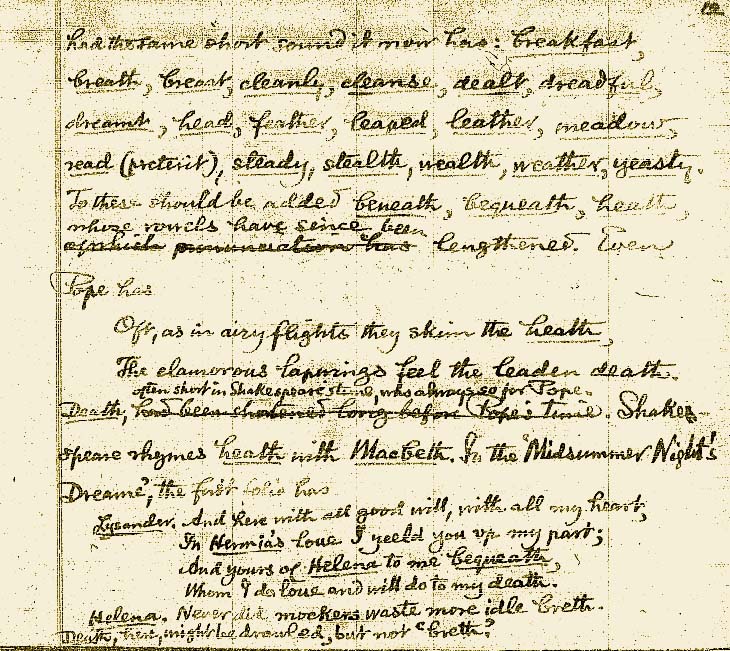
|
which had the same "short sound it now has: breakfast, breath, breast, cleanly, cleanse, dealt, dreadful, dreamt, head, feather, leaped, leather, meadow, read (preterit), steady, stealth, wealth, weather, yeasty. To these should be added beneath, bequeath, health, whose vowels have since been lengthened. Even Pope has
Oft, as in airy flights they skin the heath, The clamorous lapwings feel the leaden death. Death, often short in Shakespeare's time, was always so for Pope. Shakespeare rhymes heath with Macbeth. In the "Midsummer Night's Dreame", the first folio has: And here with all good will, with all my heart, In Hermias love I yield you up my part; And yours of Helena to me bequeath; Whom I do love and will do to my death. Helena. Never did mockers waste more idle breth. Death, here, might be drawled, but not 'breth'. |
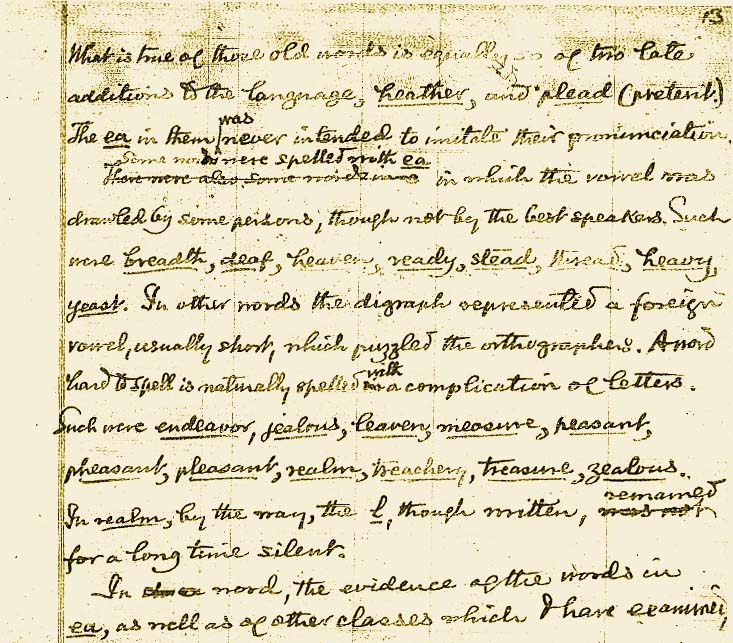
|
What is true of these old words is equally so of two late additions to the language, heather, and plead (preterit). The ea in them was never intended to imitate their pronunciation. Some words were spelled with ea in which the vowel was drawled by some persons, though not by the best speakers. Such were breadth, deaf, heaven, read, stead, thread, heavy, yeast. In other words the digraph represented a foreign vowel, usually short, which puzzled the orthographers. A word hard to spell is naturally spelled with a complication of letters. Such were endeavor, jealous, leaven, measure, peasant, pheasant, pleasant, realm, treachery, treasure, jealous. In realm, by the way, the l, though written, remained for a long time silent.
I a word, the evidence of the words in ea, as well as of other classes which I have examined, |
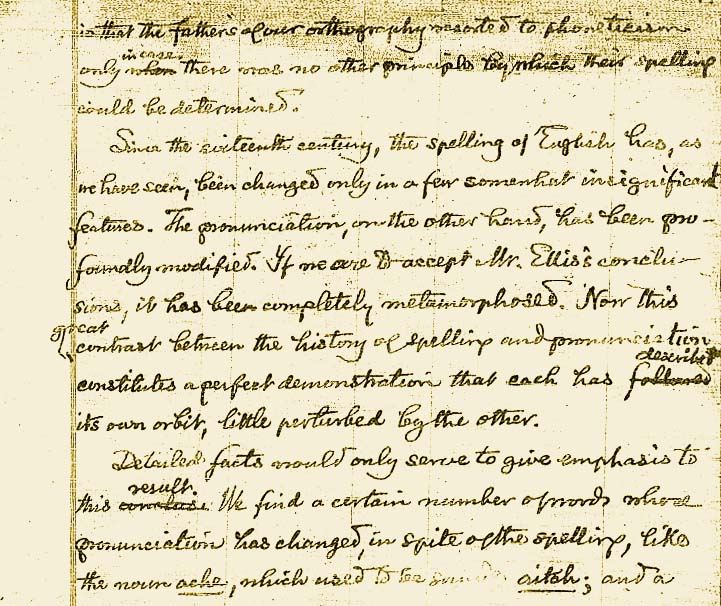
|
is that the fathers of our orthography resorted to phoneticism only in case there was no other principles by which their spelling could be determined.
Since the sixteenth century, the spelling of English has, as we have seen, been changed only in a few somewhat insignificant features. The pronunciation, on the other hand, has been profoundly modified. If we are to accept Mr. Ellis's conclusions, it has been completely metamorphosed. Now this great contrast between the history of spelling and pronunciation constitutes a perfect demonstration that each has described its own orbit, little perturbed by the other. Detailed facts would only serve to give emphasis to this result. We find certain number of words whose pronunciation has changed, in spite of the spelling, like the noun ache, which used to be sounded aitch; and |
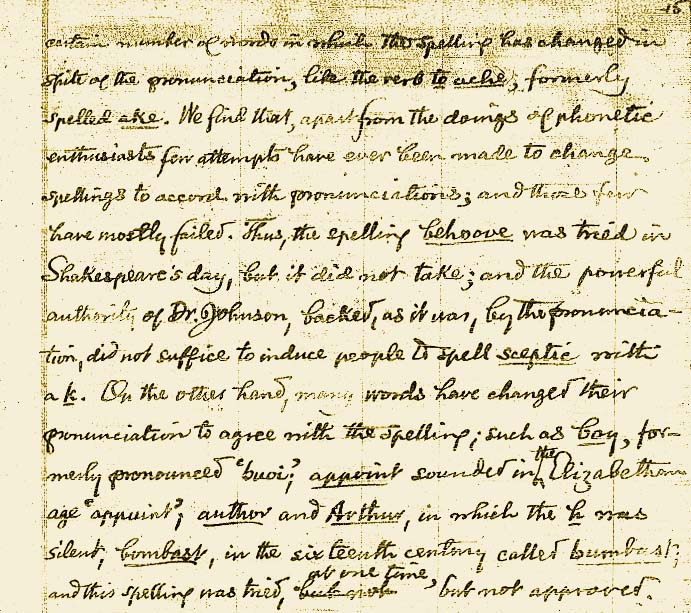
|
a certain number of words in which the spelling has changed in spite of the pronunciation, like the verb to ach, formerly spelled ake. We find that, apart from the doings of phonetic enthusiasts few attempts have ever been made to change spellings to accord with pronunciations; and those few have mostly failed. Thus, the spelling behoove was tried in Shakespeare's day, but it did not take; and the powerful authority of Dr. Johnson, backed, as it was, by the pronunciation, did not suffice to induce people to spell sceptic with a k. On the other hand, many words have changed their pronunciation to agree with the spelling; such as boy, formerly pronounced "buoi"; appoint sounded in the Elizabethan age "appuint"; author and Arthur, in which the h was silent, bombast, in the sixteenth century called bumbast; and this spelling was tried, at one time, but not approved.
|
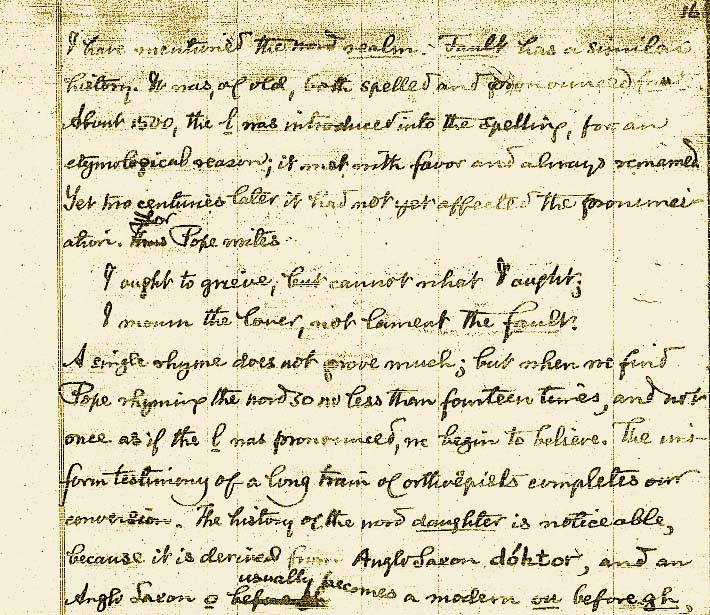
|
I have mentioned the word realm. Fault has a similar history. It was, of old, both spelled and pronounced faute. About 1500, the l was introduced into the spelling, for an etymological reason; it met with favor and always renamed. Yet two centuries later, it had not yet affected the pronunciation. For Pope writes I ought to grieve, but cannot what I ought; I mourn the lover, nor lament the fault. A single rhyme does not prove much; but when we find Pope rhyming the word so no less than fourteen times, and not once as if the l was pronounced, we begin to believe. The uniform testimony of a long train of orthoëpists completes our conversion. The history of the word daughter is noticeable, because it is derived from Anglosaxon dóhtor, and an Anglo Saxon o usually becomes a modern ou before gh, |
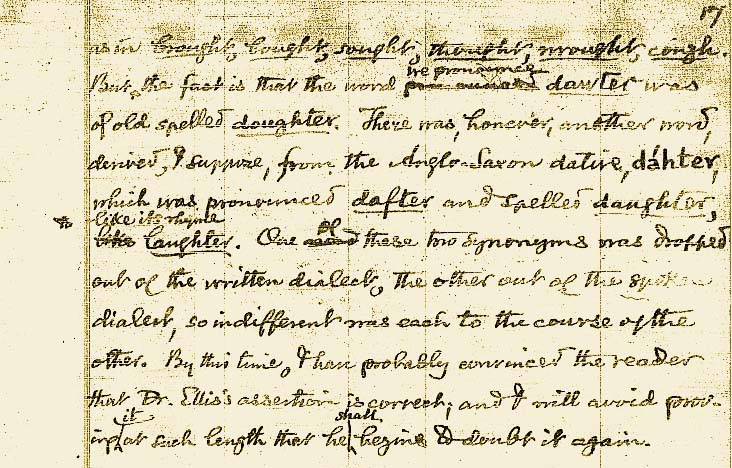
|
as in brought, bought, sought, thought, wrought, cough. But the fact is that the word we pronounce dawter was of old spelled doughter. There was, however, another word derived, I suppose, from the Anglo-Saxon dative, dáhter, which was pronounced dafter and spelled daughter, like its rhyme laughter. One of these two synonyms was dropped out of the written dialect, the other out of the spoken dialect, so indifferent was each to the course of the other. By this time, I have probably convinced the reader that Dr. Ellis's assertion is correct; and I will avoid proving it at such length that he shall begin to doubt it again.
|
Transcription by Rocío Rodríguez-Tapia (2013)
Una de las ventajas de los textos en formato electrónico respecto de los textos impresos es que pueden corregirse con gran facilidad mediante la colaboración activa de los lectores que adviertan erratas, errores o simplemente mejores transcripciones. En este sentido agradeceríamos que se enviaran todas las sugerencias y correcciones a rrtapia@alumni.unav.es
Fecha del documento:11 de junio 2014
Última actualización: 11 de junio 2014
